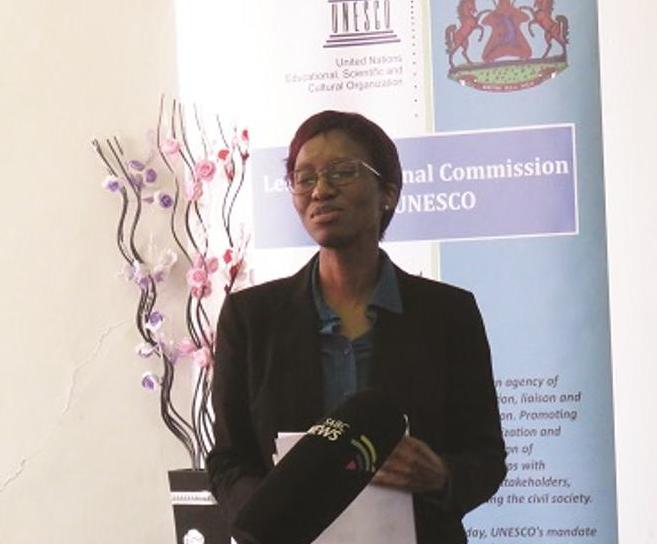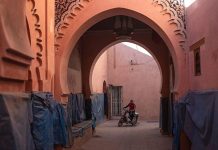Africa-Press – Lesotho. The United Nations Educational, Scientific and Cultural Organization (), the Media Institute of Southern Africa, Media practitioners and other interest groups observed the International Day for Universal Access to Information (UDAI) at the Lesotho Commission for UNESCO premises yesterday.
Themed “Access to Information-Saving lives, Building Trust, Bring Hope”, for this year’s edition, UNESCO had this to say as they pay homage to the day, “IDUAI 2020… [focuses]
on to the right to information in times of crisis and on the advantages of having constitutional, statutory and/or policy guarantees for public access to
information to save lives, build trust and help the formulation of sustainable policies through and beyond the COVID-19 crisis. ” The UNESCO’s General Conference on November 17, 2015 adopted a resolution to the effect that
September 28 will be recognized annually as the International Day for Universal Access to Information. The UNESCO Lesotho Programme Coordinator for Culture ‘Matšooana Sekokotoana read the UNESCO’s
Director General Audrey Azoulay’s message. “In a world where COVID-19 has caused chaos and complexity, access to reliable and verified information is more important than ever.
Information is essential for encouraging healthy behaviors and saving lives – rumours and inaccurate information can be as lethal as viruses,” reads the Director General’s statement in pertinent part.
Sekokotoana also urged the participants to reflect on the message and the country as far as access to information is concerned. Speaking at the event, the MISA National Director Lekhetho Ntsukunyane expressed concern over
the lagging in implementation on the part of the government to enact into laws the Receipt and Access to Information Bill. He said it is now a “rhetorical
statement”. Also, he viewed the Prime Minister’s recent statement that should a journalist be found in possession of the classified government documents, such is an offence
punishable by law. He urged the members of the public and media practitioners to stand against such a stance, adding that it requires a concerted effort to talk out of this move, adding
that government’s resolve of hoarding information is “worrisome”. Ntsukunyane further challenged that the government should be dissuaded against taking that stand.
Mothopula Seaka from Disaster Volunteer Network said there is a “flipside” to how the media conducts itself, making anecdotes of some media practitioners who are
openly affiliated to the political parties and certain politicians. “Clean your house” he quipped, adding that some media professionals are impersonating
as journalists while they are devoid of the professional qualities which are expected in the profession. He further decried the print media’s lack of regulatory frameworks.
Seaka threatened that as information consumers, they will one day stop buying newspapers and abstain from listening to local radios. The MISA National
Director reflecting on Seaka’s remarks said it is a challenge as there are no structures that can capacitate the media practitioners. He said some of the
problems within the media fraternity need robust advocacy, adding that MISA’s mandate is limited. He called for an editors’ forum, saying in Lesotho there is no such fora to which are the
gatekeepers could influence change. Ntsukunyane touched on the media as one of the thematic areas of the ongoing National Reforms. He also proposed the establishment of the Media Council which will implement the
media fraternity aspirations, such as ensuring that media practitioners are trained personnel by the recognized institutions. Also, he said there is a need for a Media Ombudsman which should deal with the media inconsistencies
adding that as of now, the court’s intervention may pose a threat to media houses due to substantial fines, which could lead to some closing up. On the other
related developments, the MISA has recently published the findings of its Transparency Assessment Report. The report findings suggested that Lesotho is
in an “unfavourable situation” regarding the access to information by its consumers. The assessment covers public institutions openness in availing its information to the public.
On one hand, National Manpower Development Secretariat (NMDS) is the 2020’s recipient of Golden Padlock Award, an award bestowed on an institution for failure to meet
set requirements in as far as disclosure of the public information is concerned. On the other hand, the National University of Lesotho (NUL) earned the Golden Key Award in
recognition for its efforts for the disclosure of information. The report has recommended that, “public and organizations need to accept that information in
their custody does not belong to them, and realize that they are merely custodians of [the] information on behalf of the public whom they serve. Organizations need to improve their information sharing efforts in order to
ensure that anyone seeking information receives it”. For the MISA 2020 edition of Transparency Assessment the following Southern Africa Development Community (SADC) countries were surveyed: Botswana, Eswatini, Lesotho, Malawi, Mozambique, Namibia, Tanzania, Zambia and Zimbabwe.
For More News And Analysis About Lesotho Follow Africa-Press






